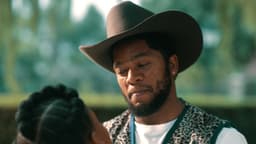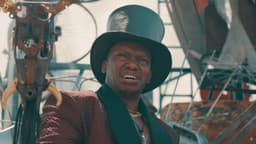
Would you fall for the Fight Night scam?
We love a heist, a hoodwink, a scam and a con. From the Ocean’s gang and their nesting-doll casino heists that centre on cons within cons, to Brooklyn Nine-Nine’s lighthearted Halloween Heist episodes, we love a host of colourful characters who can pull off a confidence trick or a Mission Impossible-style switcheroo.
So we have the popcorn ready and Wednesdays booked to watch Detective JD Hudson (Don Cheadle) wade through the facts and lies to figure out whether Gordon “Chicken Man” Williams (Kevin Hart) and his girlfriend Barbara (Taraji P. Henson) shook down guests, including underworld overlord Frank “Black Godfather” Moten (Samuel L. Jackson), at a Muhammad Ali (Dexter Darden) boxing match afterparty in the 1970s. It’s Fight Night: The Million Dollar Heist Season 1!
Watch the trailer for Fight Night: The Million Dollar Heist
To spice things up, the series is based on a real-life con man (or entrepreneur, depending on your definition). And yes, his nickname was Chicken Man. Read on for what really happened on Fight Night, as we look at three series centred on tricksters, their big cons, and whether we might have fallen for them, too.
Fight Night: The Million Dollar Heist Season 1

Chicken Man (Kevin Hart) is based on the real-life Atlanta-based con man Gordon “Chicken Man” Williams. In 1970, with everyone in town to bet on the Muhammad Ali comeback fight against Jerry Quarry, he and his girlfriend Barbara Smith helped a hustler named Fireball to host a grand, Las Vegas-themed afterparty at one of Chicken Man’s properties. The guest list featured high rollers – both legitimate and underground – lured in by literal engraved invitations. It was a rich pool to go fishing in. Even singer Diana Ross was in town for the fight, and boxing historian Bert Sugar called the crowd at the match, “the greatest collection of black money and black power ever assembled up until that time.”

During the party, Chicken Man’s guests were robbed of an estimated $1 million in cash and jewellery (worth around $8.1 million today or, if you want to cry, around R147 million).
As each guest or group of guests arrived, seven masked gunmen greeted them at the door, then led guests, including Chicken Man himself once he returned from the fight, into the house’s basement. There they were stripped to their underwear and made to lie on the floor while the robbers collected their loot. The fleecing continued for hours. More and more guests poured in until nearly naked folk were reportedly stacked on top of one another!

After the robbers fled, lead detective JD Hudson – the first black detective lieutenant on Atlanta’s vice squad – ran into a wall of silence. Only five guests filed police reports. And most others simply vanished. Too many powerful people were involved in too many shady deals to risk questioning. But they had their own suspects and as owner of the party house and unofficial co-host, Chicken Man had a target on his back. Only one person thought he could be innocent – JD Hudson.
Would you fall for the scam? Um, yes, hello? We’d go to a funeral on the promise of free drinks and a handful of snacks, let alone the chance to hobnob and gossip with this crowd! Throw in an engraved invitation and we’d even dress fancy.
Would you fall for the “scammer”? Chicken Man came up on Altanta’s streets as a cheeky teenaged street hustler, and earned his nickname by giving free chicken sandwiches to one group of pretty ladies every time he saw them on the street. In executive producer Jeff Keating’s Fight Night podcast (which sparked the series), he reveals that JD Hudson once told him that under different circumstances, Gordon Williams had the charisma and brains to have become CEO of a multi-million-dollar corporation, or the mayor of the city. Instead he ran a multi-million-dollar underground business through his connections on the street and a handful of payphones. To JD, Chicken Man was much too smart to try the Fight Night scam and think he’d live to spend the money.
McMillion$
Written and directed by James Lee Hernandez and Brian Lazarte, this six-episode true crime documentary series unravels the scam run by ex-cop Jerry Jacobson, who rallied accomplices to help him to rake in as much as $24 million during a Monopoly Game-themed promotion run by fast food chain McDonald’s between 1989 and 2001. It turns out all the game’s lucky Grand Prize “winners” who found the Instant Win game pieces that guaranteed them a $1 million payout (a one-in-205-million chance), and other choice prizes, were hand-picked by “Uncle Jerry”, who claimed his own shares of the payouts in exchange for the winners’ silence.
How did they all get so lucky? As head of security for Dittler Brothers, which printed all the “game pieces”, and later head of security for Simon Marketing – the firm in charge of running McDonald’s Monopoly – Jerry had the inside track. From there, he used his airline trips on which he was meant to distribute the winning pieces, to instead offer them to a network of cons and strangers. There were mobsters and Mormons, psychics and strip club owners, drug traffickers and con artists, all cashing in, keeping quiet, and giving Jerry his cut of each prize. His scam went unnoticed for 12 years and took an FBI investigation to uncover.
Would you fall for the scam? As an ex-Marine and ex-cop from Florida’s Hollywood Police Department, Jerry brought an air of discipline to his job as he worked his way up through the ranks after landing his first job at Dittler Brothers. By the time Dittler had the McDonald’s Monopoly contract, Jerry had a clean record and reputation. Colleagues were impressed by how thoroughly he checked the print shop workers to make sure that they weren’t trying to smuggle game pieces for themselves, even examining their shoes in spot checks and making sure workers were escorted by security during bathroom breaks. It was a classic “look over there!”
Jerry acted, spoke and worked like a movie cop, and an impressed Simon Marketing snapped him up. The move allowed him to examine every single angle of how the McDonald’s Monopoly game was run, from the printing press, to the supercomputer that handled the prize draws. And it was game over when he was put in charge of beefing up and overseeing their theft-proof system, and prize distribution. The fox was truly in the hen house, thanks to its chicken outfit and badge, and all those clucking warnings about hawks.
The Inventor: Out for Blood in Silicon Valley

This documentary draws on journalist John Carreyrou’s true crime book Bad Blood: Secrets and Lies in a Silicon Valley Startup, in which he combined his investigations into the private health firm Theranos and its founder, Elizabeth Holmes. Theranos was promising a revolution in healthcare, centred on its claim that it could run a huge battery of lab tests and scans for conditions using just the blood drawn from a single pinprick to the tip of a finger.
The documentary uses interviews with whistleblowers, journalists, medical professionals and employees to explore how Elizabeth Holmes got away with overpromising to such an astonishing extent, while keeping investors pouring money into Theranos.
Would you fall for the scam? Silicon Valley’s hard work, high demand, high risk landscape at the time normalised leaders making seemingly impossible demands as part of the “vision” that turned startup entrepreneurs into the next Elon Musk or Steve Jobs. Inside Theranos, the promise of glory and the threat of failure made a perfect trap. Elizabeth Holmes was all energy and inspiration, claiming what Theranos could do was on the verge of possibility…until you presented her with results that contradicted her goals. Any dissent was labelled a “you” problem, and the more of their time and energy employees sank into proving themselves, the harder it became to pull back when conditions became extreme.
How extreme? Theranos's chief biochemist, Ian Gibbons, who did the work that Theranos based its patents on, took his own life in 2013 after constantly being dismissed when he tried to flag issues with the technology.
Meanwhile, outside the company, Elizabeth could rely on technobabble to baffle venture capitalists who had no capacity to understand whether what she was selling them was possible, since their qualification was simply “money”. While she was an engineering school dropout with no medical qualifications, she had a firm grip on the language and promises that excited investors, and a host of attractive names on her board of directors. There was no indication that their product tests were tampered with behind the scenes, or that reports were faked. Theranos was secretive, but it was a competitive market. They couldn’t just give anyone the keys to their groundbreaking research and product development. And if rivals Quest Diagnostics and LabCorp called their results into question, Elizabeth had grounds for accusing them of trying to undermine Theranos.
Rich and greedy, poor and honest, or just out to party, tell us a good story and we’re putty in your hands. Sweeten the deal by looking right and promising us money, and we’ll snap it up like Chicken Man’s free sandwiches.
Also watch: Look out for Heist 88, on Showmax from Monday, 25 November.
More like this

Jojo on The Real Housewives Ultimate Girls Trip: Africa reunion, social media backlash and more
Jojo opens up about the highly anticipated reunion for The Real Housewives Ultimate Girls Trip: Africa, coming to Showmax on 20 and 27 February.

South Africa’s stories and storytellers recognised as SAFTA nominees announced
Mzansi’s boldest stories take centre stage as the 2026 SAFTA nominees are unveiled, with a wave of nominations across DStv and Showmax.

The ‘Burbs S1
In this adaptation of the 1980s Tom Hanks dark comedy, a couple moves back to the husband's hometown, only to face a cul-de-sac shrouded in mystery.

“You don't create something so powerful purely through military tactics” - Shaka iLembe co-creator
Shaka iLembe co-creator Desireé Markgraaff reflects on the vision, research, and importance of telling our stories. Stream Seasons 1–2 on Showmax.

Where to see the cast of Shaka iLembe S1-2 on Showmax
From Nomzamo Mbatha as Queen Nandi to Lemogang Tsipa as King Shaka Zulu and Thembinkosi Mthembu as King Dingiswayo, see the cast of Shaka iLembe in some of their other acclaimed roles on Showmax. Binge now on Showmax.

MaBlerh to host the first-ever The Real Housewives Ultimate Girls Trip: Africa reunion
MaBlerh will host the first-ever reunion for The Real Housewives Ultimate Girls Trip: Africa, set to air in two parts in February 2026.

Shaka iLembe S1-2
Set in the 1700s, Shaka iLembe tells the story of the making of the iconic African king. All episodes are now available to binge.

Six Taylor Sheridan series while we wait for The Madison
Excited about The Madison coming in April? We’ve rounded up all the Taylor Sheridan series you can watch on Showmax while we wait.
Outlaws, now streaming on Showmax
Go on holiday with RHUGT: Africa
More hit series to stream

Jojo on The Real Housewives Ultimate Girls Trip: Africa reunion, social media backlash and more
Jojo opens up about the highly anticipated reunion for The Real Housewives Ultimate Girls Trip: Africa, coming to Showmax on 20 and 27 February.

South Africa’s stories and storytellers recognised as SAFTA nominees announced
Mzansi’s boldest stories take centre stage as the 2026 SAFTA nominees are unveiled, with a wave of nominations across DStv and Showmax.

Billy Joel: And So It Goes (2025)
An honest, insightful, and deeply moving look at the life and career of acclaimed musician Billy Joel, covering both his struggles and triumphs.

Surviving Mormonism with Heather Gay S1
Former RHOSLC cast member Heather Gay investigates hidden truths within the Mormon church, exposing cracks in its perfect facade.
Latest Stories

Schalk Bezuidenhout trades stand-up for 9-5 in Die Kantoor

A heartbreaking loss: Nolwandle Biyela’s final stand in Outlaws Season 2

Fall in love with romantic drama Touch, now on Showmax

Antonie Marx on Volspoed and why it's a must-watch

Sandra Stein makes her debut on Law, Love and Betrayal S2

Albert Pretorius on Die Kantoor, SA’s re-imagining of The Office

20+ addictive South African reality shows to stream

Where to watch The Real Housewives franchise online

How to Train Your Dragon: Bringing Hiccup and Astrid to life

What to watch on Showmax in January 2026

7 things to know about indie award-winning movie Dìdi

Mission: Impossible – The Final Reckoning’s South African stunts

Die Kwiksilwers (2024)

Where to see the cast of Mpondoland on Showmax

Angel on The Real Housewives Ultimate Girls Trip, Jojo and more

Thandolwethu Zondi on his new role in Outlaws S2
Must-watch trailer for Showmax's turbo-charged reality series Volspoed

The Real Housewives Ultimate Girls Trip cast on first impressions, beefs and more

Fana Mokoena on playing a sangoma in Masinga

Princess Jecoco on The Real Housewives Ultimate Girls Trip Africa

Tlali returns: Outlaws’ most loved and hated villain is back

Novocaine: the US box office hit shot in Cape Town

Why Jackie Phamotse says Slay Queens is a must-watch

Evodia on Ultimate Girls Trip Africa and her return to reality TV







